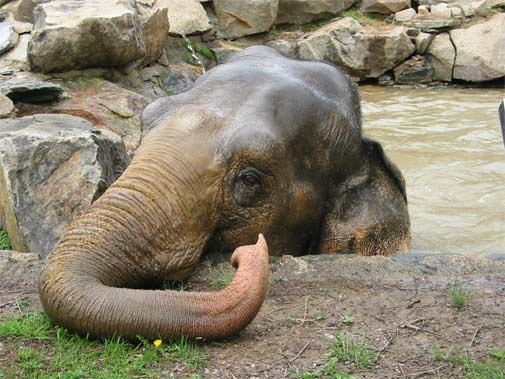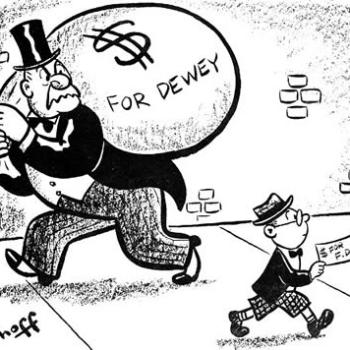(The following started out as the introduction to today’s Left Behind post, then it kind of got away from me a bit, so I’m breaking it off here as it’s own post.)
I haven’t researched this carefully, but the elephant seems to be winning.
The idiom of choice — or cliché, if you want to be critical about it — for people refusing to acknowledge an urgent problem that ought to be their priority used to be “the 800-pound gorilla in the room.” (The weight of the gorilla varied, but it was usually a gorilla.) In recent years, though, the idiom seems to be shifting as the gorilla has gotten some competition from the elephant in the room.
Either one works. Both images convey the absurdity of trying to go about one’s business while ignoring something that it seems impossible to ignore. I’m not sure what, if anything, the shift from a large gorilla to an even-larger elephant signifies. I suspect the elephant may have wandered in from the folk-tale about the blind men, which has a somewhat similar point about the obliviousness of a limited perspective. Or maybe it has to do with Republicans. In any case, though, the elephant seems to be steadily replacing the gorilla.

This is probably a good thing. It’s a useful idiom, and freshening it up a bit may be helpful, so let’s not stop with the elephant. Let’s keep freshening it up — the velociraptor in the room, the exploding dirigible in the room (too soon?), or the Arrakian Sandworm in the room.
Whatever the form, the delightful thing about this image is not just the incongruous, intrusive presence of the elephant, but the idea of the people in the room blithely going about their usual business as best they can while refusing to acknowledge the rather emphatic presence of the misplaced pachyderm.
The idiom is popular because it exaggerates a real human tendency we can all recognize, and because it doesn’t exaggerate it all that much.
Yes, elephants are enormous, spectacular creatures and we’re all quite certain that the sudden presence of such a glorious creature in our own living rooms, or our own yards, or even our own neighborhoods would instantly rearrange all of our priorities and rewrite all of our schedules until it was dealt with. And that’s certainly true.
But social pressure is also a powerful thing. As certain as I am that I would snap to attention at the presence of an elephant (or gorilla) in my room, where I set the tone, I’m less confident of how I would respond in the unlikely circumstance the idiom describes — if I walked into a room for some gathering and encountered both a literal elephant and a literal group of people who neither mentioned nor acknowledged its presence.
One doesn’t want to seem rude, after all. Or stupid.
Surely the others are aware of the elephant, I’d be thinking, so there can’t be any need to point it out. I wouldn’t want to be Captain Obvious. I might ask what it was doing there, or how it got there, or what they intended to do about it, but the sheer enormity of the beast would make that an awkward question. I would probably have the sneaking suspicion that I already ought to know the answer. If I’m shocked and flabbergasted by something that everyone else seems to find utterly unremarkable, I start to suspect that they must all know something I don’t — something I ought to know and, therefore, maybe shouldn’t admit to having missed. I start to think maybe it’s better not to say anything, just quietly try to bring myself up to speed before everyone realizes I missed the memo about the elephant.
In real life, actually, I’ve had the chance to meet several elephants up close. And every time I’ve been allowed anywhere near an elephant, I’ve involuntarily cried out, “Whoa! An elephant!” and had a minor manic episode of unsuppressed, hyper-verbal glee. Because, you know, elephant.
Still, though, that social pressure I describe above can be almost as enormous, tangible and intimidating as any elephant. If there are enough other people around and they are all uniformly steadfast and confident in their disregard, their implacability and their nonchalance, then whatever regard and, um, placability and chalance I might be otherwise feeling tends to get squelched — even if it was initially of elephantine proportions.
If my initial squeals of delight were shrugged off with something cryptically dismissive — “Oh, yes, that. Been meaning to call someone. How’re things at home?” — then I can imagine myself submitting to the prevailing mood and settling into an awkward, baffled silence.
I can even imagine the arrival of another friend who would walk into the room, her eyes widening in wonder at the sight. And then I’d shoot her a silent warning look — Don’t say anything about the elephant!
I’m not proud to be able to imagine such a scenario.
It’s embarrassing to admit that I could be so weak as to allow social pressure to make me play along with the sort of absurdly massive denial it would take to keep silent about something so huge and urgent.
But I sometimes find myself doing exactly that with regard to poverty, homelessness, war, Christian patriarchy, white privilege and climate change, so I can’t be sure I wouldn’t do the same thing if faced with a literal elephant in a literal room.
















